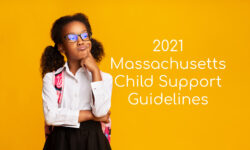by: Julia Rodgers
Many divorcing parents in Massachusetts believe that an intact two-parent household is almost always better than having a “broken” home. However, if you are contemplating a divorce and you have children, you must consider the lasting effect that your marital problems will have on how your children view relationships.[1] Sometimes the pain and anger that accompanies a divorce can overpower your ability to keep a calm demeanor around your kids. In other cases, one parent did not want the divorce, and will make sure the kids knew it was the other parents’ decision. Depending on the age and maturity of your children, these reactions to a divorce can be more or less harmful.
Kids Model Their Parents’ Behavior
Many people ask the question, “Should I stay in my failing marriage for the sake of my children?” and “My kids will only be happy if they have both parents under one roof.” Very commonly, divorcing parents have an immense amount of fear that their children will respond negatively to the divorce. They guilt themselves into sacrificing their own happiness as prevention for disrupting the entire household.
Regardless of whether you choose the route of divorce in Massachusetts or decide to see how things play out, you must note that the behavior you and your spouse display in the home can set the stage for how your children will act of their own relationships as adults. Children observe everything. While you may believe you are keeping your children blissfully in the dark about your marital issues, your kids will detect subtle changes in their home environment, and begin to act out. Over time, children often model their parents’ behavior as it pertains to how to treat a love interest, how to resolve conflict, how to react to stressors and triggers, and how to compromise and get along with others.
When couples in unhealthy marriages stay together, it could create a disruptive atmosphere at home. The home environment becomes uncomfortable, confusing, and tense for the child. Perhaps the stress caused by the breakdown of your marriage is causing you to slack off in the parenting department. Maybe you are guilty of being impatient, short, or bitter with your children when your strained marriage got the better of you. Even worse, when couples remain in broken relationships for years beyond their expiration, it creates a flawed model for children to follow later in life. If this is an area of great concern for you, you’re not wrong. As your child matures, your behavior and interactions with your spouse may be sending confusing messages about how to deal with marital differences, relationships, and any of life’s challenges.
If you intend to send positive messages to your children that suggest relationships can be beautifully successful, respectful, and loving, then this is what you must strive to display at home. This can be somewhat difficult for couples who are on the brink of an emotional divorce, but remaining aware of your pint-sized audience will act as proper motivation. Even if your children aren’t pint-sized, it’s important to model a mature response to a messy situation, which can help set the tone for healthy relationships.
It Is Possible for Your Children to Benefit from Divorce
In a recent survey by the family law organization Resolution, 82% of children between the ages of 14 and 22 who have endured family breakups said they would rather their parents get a divorce than watch them remain in an unhealthy marriage.[2] The children further advised against their parents staying together for another few years for a child’s sake and then divorcing on bad terms. Thus, growing up in a dysfunctional, discordant family with married parents can be far more problematic than divorce.
When a household is in disarray and the chaotic or damaging environment is having a negative impact on children, a divorce can be better than staying together:
- When children witness their parents constantly fighting and generally not getting along. This creates a sense of fear in the child’s mind, and he or she may be more prone to act out in anger as an adult.
- When children feel that their core foundation has become threatened and appear to be unstable due to the fear associated with the anger, rage, and outbursts to which they are exposed to because of their parents.
- When children witness at least one of their parents being attacked in any way — verbally, emotionally, physically, etc. — it makes children feel highly vulnerable and unsafe, especially if they are unable to effectively help the parent who is being victimized.
Alternatively, if you feel like your relationship is salvageable but you need some help in learning how to control negative emotions and resolve conflict, marriage or family counseling may be an excellent option. The choice to see a counselor will help teach your children how to work through issues and develop healthy interpersonal communication skills.
Allow Your Children to See You (and Your Spouse) in the Best Possible Light
Whatever you and your spouse decide to do, you should make every effort to commit to making the process as smooth and drama-free as possible. In cases where conflict is unavoidable, parents should continue to make every effort to prioritize being the best possible parents to their children. Provide them with as much affection and nurturing as they need in order to understand they are loved and without blame. Children have an uncanny ability to find reasons to feel like things are their fault, so it's important to counteract these thoughts with positive reinforcement.
Watching their parents get a divorce can make children feel like they are being pulled in two different directions. They might feel like they have to make a choice between one parent or the other. It is important to make sure children do not feel like they have to choose between parents. This is an unhealthy and selfish situation in which to put your children. Children should never be dragged into the middle of marriage or divorce-related conflict, nor should they be exposed to “bad talk” from one parent about the other.
Lastly, parents owe it to their children to make every effort to avoid being responsible for creating bad childhood memories that leave emotional scars. It’s not always the divorce itself that impacts the child most, but rather how the divorce is handled — and how both you and your spouse behave and co-parent before, during, and after the process. Your child has the absolute right to love the other parent, even if you no longer do.

To speak with a lawyer about divorce or a child custody matter, contact Mavrides Law in Boston or Wellesley, MA. To schedule an in-depth initial consultation, call 617-723-9900 or contact the firm at info@mavrideslaw.com
All content provided on this blog is for informational purposes only. You should not act upon any such information without first seeking qualified professional counsel on your specific matter. Mavrides Law makes no representations as to the accuracy or completeness of any information on this site. Mavrides Law will not be liable for any errors or omissions in this information nor for the availability of this information. These terms and conditions of use are subject to change at any time and without notice. Communication of information by, in, to or through this Website and your receipt or use of it (1) is not provided in the course of and does not create or constitute an attorney-client relationship, (2) is not intended as a solicitation, (3) is not intended to convey or constitute legal advice, and (4) is not a substitute for obtaining legal advice from a qualified attorney.
[1] Holistic Divorce, http://www.holisticdivorce.com.
[2] Owen Bowcott, “Children of Divorce: 82% Rather Parents Separate Then ‘Stay for the Kids’,” The Guardian, last modified November 22, 2015, https://www.theguardian.com/lifeandstyle/2015/nov/22/children-divorce-resolution-survey-rather-parents-separate.






